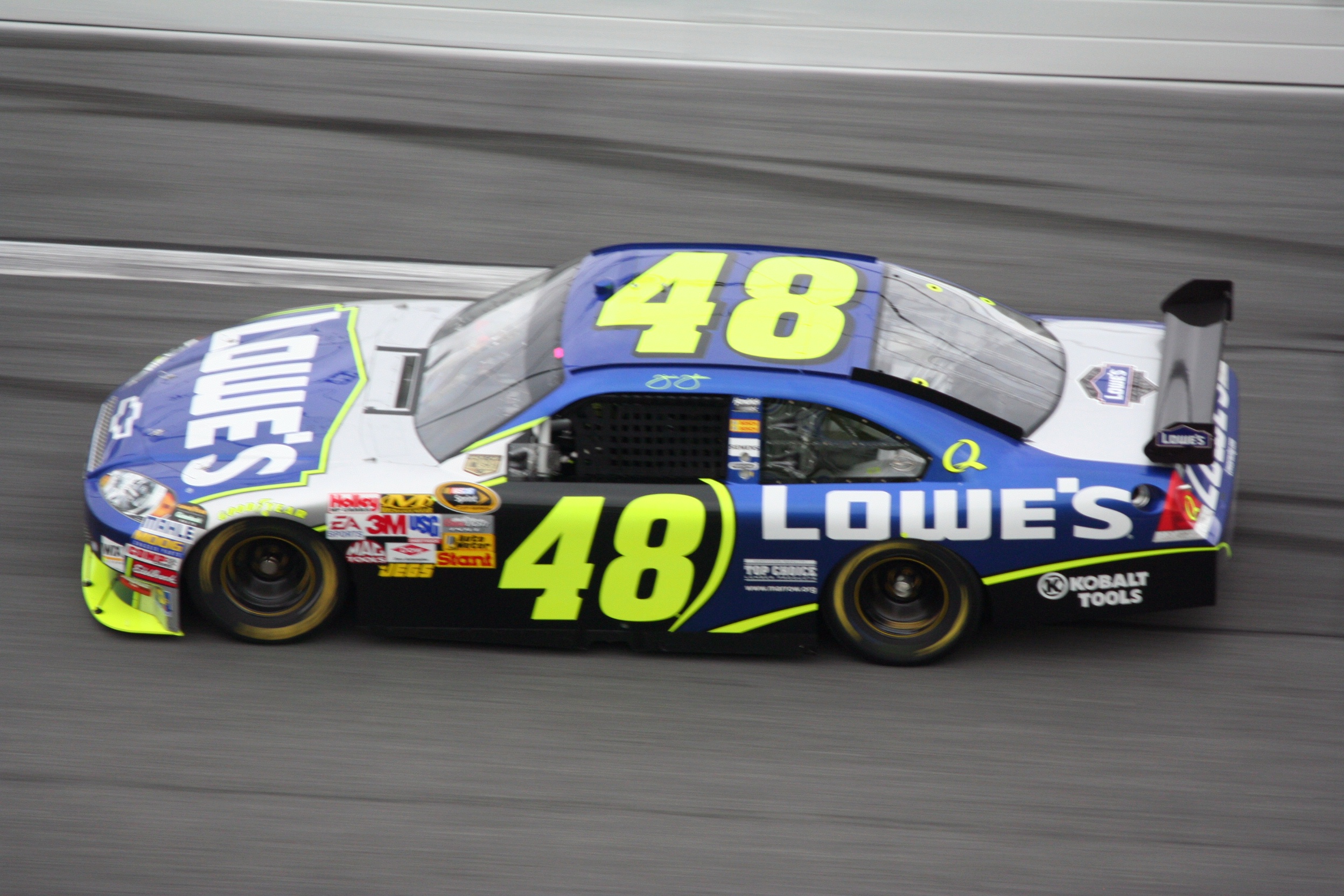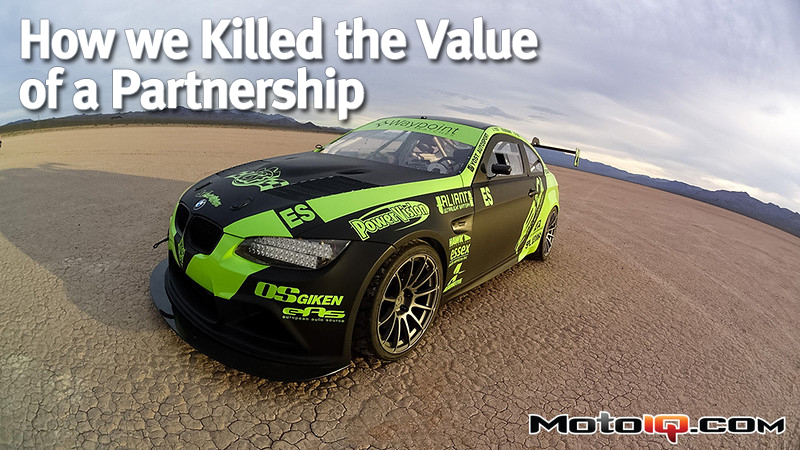,
If you want direct sales, hire a salesman. If you want to shape and influence the perception of your brand, partnerships are the way to go. Do you think Lowe’s Home Improvement knows how many hammers Jimmy Johnson sold in 2015? Absolutely not, nor do they care. The amount of TV time and brand recognition he gave them would have cost them 10x as much as they gave his team if they tried to duplicate it by buying commercial air time, magazine ads, online ads, etc. And that’s only a part of their value they get back that has nothing to do with direct sales. Even on our own endurance race team we have a partner that doesn’t even sell a product. They sell a very specific business to business service that has nothing to do with the automotive industry at all. We could wrap our car in their logos, we could tell as many people as we could about who they are and what they do. We could educate 10,000 people in the automotive industry on what this company does and not a single one of you could buy their service even if you wanted to. There is ZERO value in their name being on our car yet every year they write us a check and in return, every year we use a small part of that check to rent out a race track and host a private event for 10-15 of their invited guests and we give them ride-a-longs in a race car. The value to them is being able to provide their employees and their high-end clients a unique and unforgettable team building experience and it’s worth every penny to them. Don’t think that’s uncommon either. You better bet that Jimmy Johnson’s (well, Hendrick Motorsports’) contract with Lowe’s says nothing about sales, but has a big section on providing hospitality at every race for their invited guests. So think outside the box because there’s opportunity everywhere that is being missed because it doesn’t fit the standard mold.
 No one at Lowes is asking how many hammers Jimmy Johnson sold for them during the past years they've sponsored him.
No one at Lowes is asking how many hammers Jimmy Johnson sold for them during the past years they've sponsored him.How Drivers, Teams, Builders, Etc. Killed Partnerships
Now that I have thoroughly beat up the companies it’s time to beat up on the other part of the problem, the drivers, teams, builders, etc. that accept these partnerships and sponsorships. Companies offer partnerships that are very low risk on their end and high risk on your end because they get away with it. Every time a program gives up the farm and takes a bad deal it hurts everyone else that comes along afterward. Why would a company invest anything in your program when they can get paid to have people market their product instead? Here’s how the other half ruined partnerships:
Over-Promise and Under Deliver
Realize the true value of your program and where that value lies. The truth is many programs out there don’t have much value at all, but nobody wants to admit that their own program falls into that category. Good programs take a lot of work and a lot of money to build. You cannot sell dreams, they have no value, which is why I absolutely hate crowd funding for sponsorship but that’s a different topic. Only promise things you can accomplish without any additional help from partners at all. Partnerships should be designed to make a program better, not to allow it to exist in the first place. All too often you hear horror stories and excuses from people explaining why they didn’t follow through on their promises. “Well, I know I promised I would go to 10 events but my engine blew up at round #2 and I can’t afford to fix it.” All you are doing is setting you and all of your partners up for failure and burning bridges in the process. Everyone in a partnership should only be surprised with good news, not bad news. If you do it right, your program will grow, your partners will be happy, and the next year you’ll be able to promise more and if you can promise more you can ask for more, but if you under-deliver you’re back to square one.

Giving Free Advertising
There is one team in particular who I follow, who will remain nameless, that do this incessantly. They are constantly making Instagram posts and tagging companies and buying products and advertising them through their social media in an attempt to get those companies to notice them and reciprocate with a partnership. I am always curious as to how that conversation goes when they finally talk and try to sell them something they’re already giving them for free. It’s so bad that only 10% of their posts are promoting their actual partners while 90% are about companies that they are trying to land! It’s a program where you actually get less exposure by them after you partner up than you did before you gave them anything. You cannot sell a company something that you’re already giving them for free. You are completely devaluing partnership for not only you, but for everyone else as well. The next time you hear a company say there’s no value in Instagram exposure because it’s so easy to get for free you know exactly who to blame.
Never Saying No
Not every partnership is going to work. Not every company is right for every team or situation. Again, do not set yourself up for failure. No matter how badly you want to partner with this particular brand, no matter how much they’re offering you, if you cannot turn around and give them above and beyond what they want in return DO NOT TAKE THE DEAL. Through working on partnership acquisition with race teams I have been involved with I am always shocked to hear from many companies that I am the only one that has ever told them no or turned down free product or even money. They are always shocked and often offended at first when I say no simply because they aren’t used to hearing it. It’s when I tell them why that they finally understand. We are fortunate enough to have built some real value in our endurance racing program and we are at the point where have to say no to a lot of people. We don’t do it because we think we’re better than anyone else, we don’t even do it because we want to. It’s hard to turn anything down for free but often times you have to in order to maintain the value of your program. Each partner on our car is bringing their own level of investment into our program whether it is with cash, product, service, or any number of other ways companies can add value but they establish a going rate of what it takes to be on our car by what they are actually investing. If you came to me and said that you wanted to give me a $500 part for our race car that we actually need in return for a sticker on our car I would have to say no, no matter how badly I wanted that part. Why? Because everyone on that car has invested far more than $500 into our program and it would be slapping them in the face if I sold something to them for a much higher rate than I sell it to someone else. The partners I have that are already invested in my program are the most important people to me no matter what, the last thing I want to do is upset them by devaluing their contribution. After I explain this to the guy I just said no to he usually realizes that he would want me to do the exact same thing if he were in their shoes. We leave the conversation with a mutual understanding that the stars did not align for this particular deal but the bridge is not burnt, in fact it’s usually stronger than it was before. Sometimes that same guy will come back with a better offer down the road and we can make a deal, or sometimes I may come across an opportunity that fits what he was looking for and I bring that deal to him. Either way, don’t be afraid to say no if the deal isn’t good because it doesn’t necessarily mean you’ll never get the chance to work with them again and if you do, chances are they’ll have a lot more faith in working with you the next time.
 If the partnership makes sense then there's nothing wrong with a little Butt Paste on your car.
If the partnership makes sense then there's nothing wrong with a little Butt Paste on your car.How to Fix It
In reality, the specifics of every partnership and sponsorship deal should be very specific and different. Figure out where your company needs the most help and choose partnerships that can help you the most in each area. Be as creative as possible as there are tons of opportunities out there that are being missed because everyone is trying to stick to the industry standard. Unfortunately the industry standard isn’t working and it has turned the partnership/sponsorship part of our industry into what it is today. Being a “sponsored” program today is meaningless and that’s what needs to change. Here’s how I say we do that.
Protect the Value of Your Product
The big underlying problem here is that so many people in the sponsorship/partnership part of our industry are devaluing the public’s perception of their own products. From a company standpoint; do you ever complain as to why nobody is willing to pay full retail for your product anymore? Even the ones who aren’t proposing partnership/sponsorship want hands outs and discounts. They go to forums and do back-door below MAP deals with your dealers because that is the new industry standard. Why? It’s because companies have made it far too easy to get sponsorships and partnerships. There’s no exclusivity in it anymore and it’s no longer something that is earned, it is expected. Every time you get a bad sponsorship proposal or an email that says “hey, give me free parts because I have 1000 Instagram followers” that is a direct representation of the public perception of your product. People actually think it’s that easy to get your product for free. Make your partnership/sponsorship program much more exclusive and re-establish the public perception of your product’s value. Red Bull and Monster Energy mastered this in the extreme sports world by hand picking a small, high quality team of people and keeping Red Bull/Monster partnerships very exclusive. They gave their athletes hats, shirts, and other team only gear that were not available to the public and the general public went absolutely crazy for them BECAUSE THEY COULD NOT GET THEM. It had absolutely nothing to do with the product; there was exclusivity to the brand. When you saw someone with a Red Bull or Monster hat on you knew that they were the real deal and it made them instant celebrities within their sport. It created a rivalry that both companies benefitted from immensely. Fast forward 5 years and now you see thousands of examples of people advertising their favorite energy drink brand for free. In the end, these energy drink companies still get tons of free advertising from their customers based on the fact that they are actually proud to represent that particular brand, not just because they got a discount. These energy drink companies still saw tremendous growth in sales, and created one of the biggest industries in the world almost exclusively through athlete partnerships. Think about the power of that type of strategic partnership program. Red Bull’s stupid animated TV commercials didn’t do anything for that brand, it was all about their athlete program, other energy drink companies followed suit and it created a massive industry that had far less to do with the product than it did the public perception of the brand. The Red Bull/Monster logos are far more valuable than their energy drink recipe and they did that by making Red Bull/Monster athletes a title that people hold on a very high pedestal. To this day, energy drink partnerships are the holy grail of partnerships in almost any sport because they are so hard to get. They are reserved for the best of the best. Create a public perception of value and protect it by having a smaller, higher quality group of partnerships and sponsorships. For you marketing heads out there reading this, how much nicer does it sound to only have to manage 10 high profile programs that you can be actively involved in instead of 200 valueless ones?
This goes for the other side of partnerships and sponsorships as well. Race teams, drivers, builders, etc. Do not de-value your own program by accepting sub-par offers and you will create desire to be a part of your team. Have fewer and higher quality partners that you can be heavily involved with as well. Make it to where companies are fighting to be a part of your program. Manage the industry’s perception of value for your product…you!



